For those looking to embrace a new role and contribute to an optimistic and sustainable future, a manufacturing and operations job could be the right fit. Production operators are critical to modern manufacturing practices across biotechnology, diagnostics and life sciences.
Explore what production operators do and what to expect in this role.
Table of Contents
- What Is a Production Operator?
- Typical Job Duties and Responsibilities
- Types of Production Operators
- Common Job Requirements
- Salary and Earnings Potential
- Career Growth Opportunities
- Explore Production Operator Roles
What Is a Production Operator?
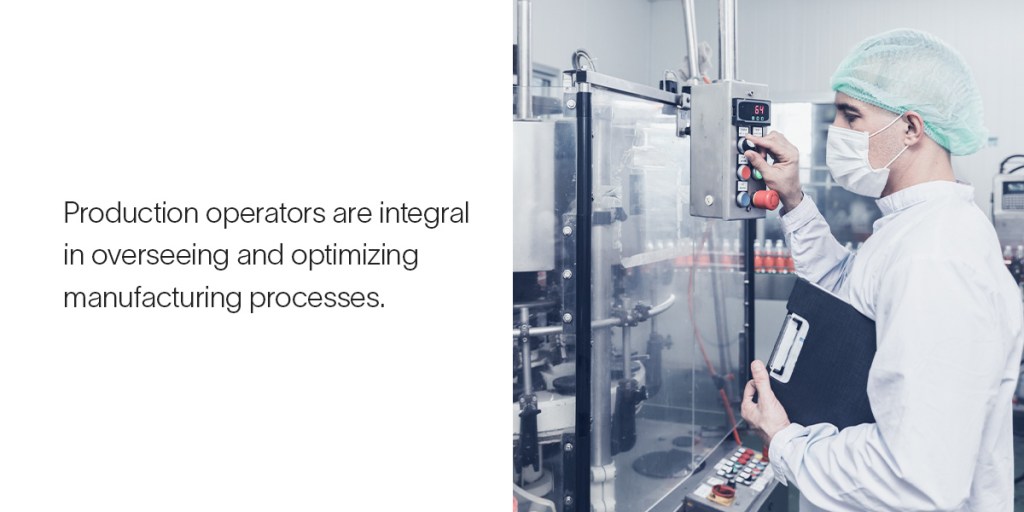
A production operator is a skilled professional responsible for setting up, running and monitoring manufacturing equipment and processes. The role involves technical expertise and oversight to ensure product quality control.
A great production operator commits to continuous improvement and safety, helping facilities refine their production practices to achieve optimization. This role can include diverse responsibilities and practices — all aiming to set production up for success in creating the most impactful and valuable products for consumers.
The Importance of Production Operators
Production operators are crucial to many manufacturing activities.
- Production quality: Operators are an important first line of defense in maintaining product quality in manufacturing settings. They help ensure adherence to strict standards, especially in highly regulated industries like biotech and diagnostics. This role is also often responsible for validating production processes through inspection, testing and proper documentation of procedures and nonconformance control.
- Safety and compliance: Production operators help facilities align daily practices with standard opearting procedures (SOPs) to support worker safety and product throughput. They also make sure processes follow other important environmental, health and safety (EHS) requirements. A production operator’s duties help advance sustainability initiatives and create a happier, healthier working environment.
- Productivity: One of the integral duties of a production operator is using their technical know-how and procedural expertise to drive throughput, reduce the risk of downtime and boost delivery performance. Thorough oversight and prompt troubleshooting can help production machinery sustain high productivity levels, driving overall success for manufacturing operations.
- Innovation: Advancement is at the core of production operator duties. This role helps manufacturing plants identify opportunities for process improvements to propel innovation. Operators often work closely with engineering and quality assurance professionals to create the most effective systems possible.
Production operators participate in several key aspects of manufacturing, helping businesses harness the most effective daily production processes.
Typical Production Operator Job Duties and Responsibilities
Production operator job descriptions may vary depending on the specific company, role and process. The following are common responsibilities these individuals may tackle daily.
Equipment Inspections and Safety Checks
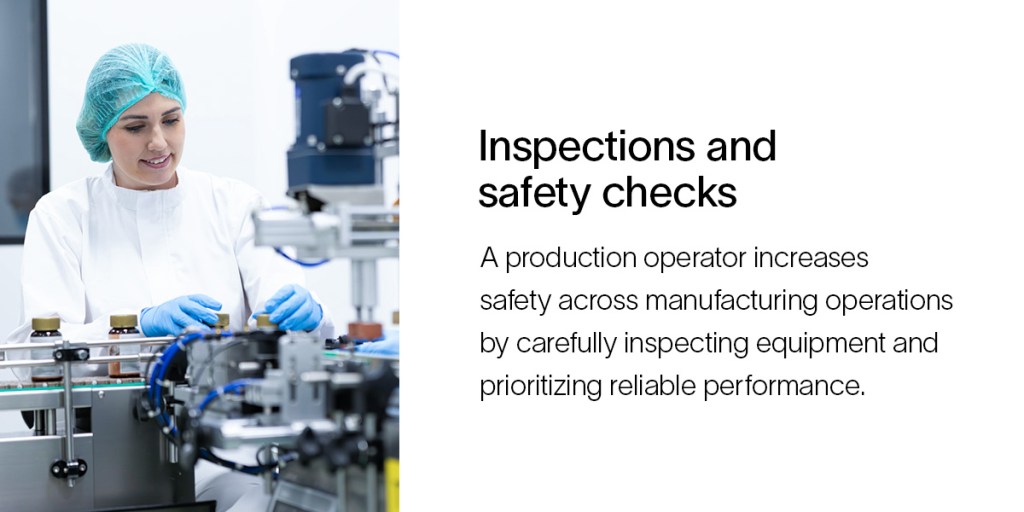
A production operator is often in charge of reviewing production schedules and analyzing priority work orders to ensure pertinent maintenance tasks are completed on time. They typically complete thorough pre-shift equipment inspections and safety checks.
This role is also often responsible for verifying the following to create smooth manufacturing processes:
- Materials
- Lot numbers
- Tooling availability
Machine Operation and Monitoring
After inspections and safety checks, production operators set up equipment and manufacturing systems. They assess whether machines are running within specified parameters. For instance, operators might check gauges, human-machine interfaces or data logs to ensure proper operation.
Individuals in this role are often in charge of minimizing downtime by performing routine adjustments and addressing changeovers.
Quality Assurance and Documentation
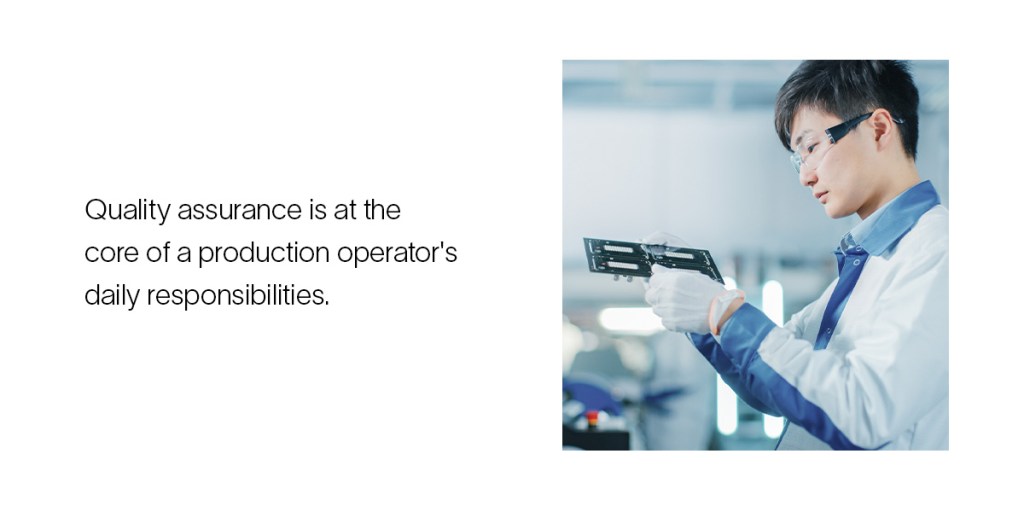
An important part of a production operator’s daily activities is quality assurance. This job often involves visual, dimensional and functional inspections of materials and production equipment parts using tools such as:
- Calipers.
- Gauges.
- Micrometers.
- Scales.
- Test rigs.
- Torque drivers.
Proper recordkeeping is essential in manufacturing. Production operators must record data in batch records, device history records and manufacturing execution systems (MESs).
This role is typically responsible for following good documentation practices to establish traceable and compliant production processes.
Maintenance and Troubleshooting
Production operators are often integral to maintenance procedures. Proper sanitizing and standardization are important for keeping manufacturing facilities clean and ready for operation. This job typically involves collaborating with maintenance and engineering teams to troubleshoot equipment issues. Operators can help proactively address problems to minimize potential downtime and support safety.
A production operator’s equipment expertise and technical know-how help these individuals identify maintenance-related issues before they lead to costly breakdowns, repairs and replacements.
Continuous Improvement
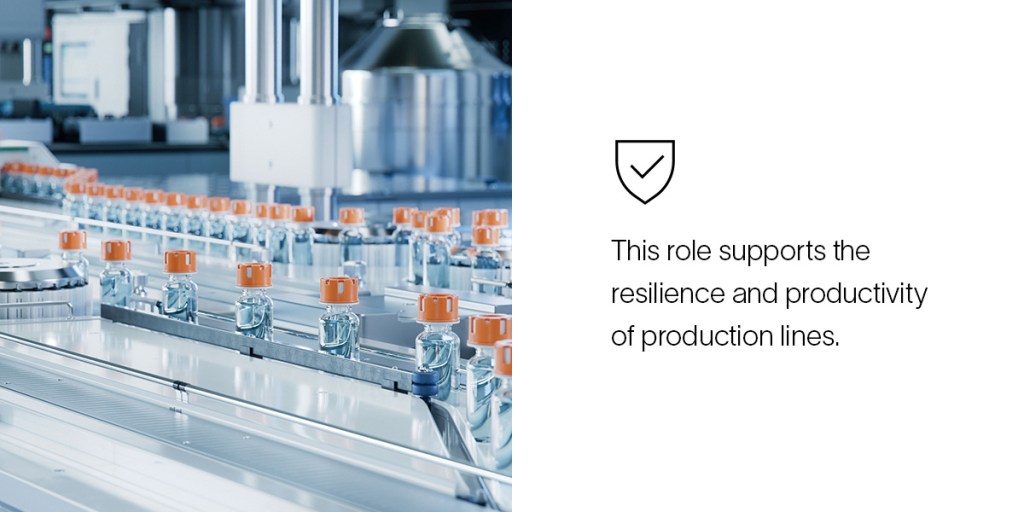
A production operator’s job involves teamwork and robust collaboration. Connecting with other departments and workers is key to smooth shift hand-offs and transitions. Operators must communicate production status, contribute to daily standup meetings and participate in problem-solving.
Thorough communication is key to driving continuous improvement across the manufacturing process. Operators are responsible for the resilience and productivity of production lines. Part of the job is finding ways to refine processes, address bottlenecks and enhance efficiency.
Types of Production Operators
The title of production operator can indicate different responsibilities, depending on the specific role. Job seekers may see variations of this job with titles similar to the following:
- Machine operator: This role works directly with automated or semiautomated equipment, such as injection molders, presses, fillers, computer numerical control (CNC) machines, or surface-mount technology systems. They’re responsible for loading and unloading parts, setting parameters, performing basic offsets and monitoring equipment wear. Routine maintenance and changeovers are important parts of this job.
- Process operator: These operators may run batch or continuous processes, like filtration, blending, mixing or chromatography. They typically work in controlled environments and must adhere to sterile techniques and navigate clean-in-place/steam-in-place systems. This role must strictly follow the facility’s current good manufacturing practices and EHS requirements.
- Packaging operator: This job involves operating lines for tasks like filling, capping, labeling, cartoning, palletizing or blistering. Workers are in charge of verifying codes, labels and seals to ensure accuracy. They’re also responsible for maintaining packaging integrity for consumers and compliance with relevant regulatory requirements.
- Cleanroom operator: An operator working in an International Organization for Standardization-classified environment must follow strict protocols relating to gowning and personal protective equipment. This role typically handles sensitive products, such as diagnostic cartridges or medical consumables. The operator is also responsible for adhering to contamination control and particulate monitoring standards.
- Assembly operator: This type of production operator builds products and subassemblies according to assembly procedures and SOPs. They often work with hand tools, torque devices and fixtures. They may also be responsible for adhering to electrostatic discharge protocols.
- Quality/inspection operator: Operators working in quality assurance must focus on close inspection and testing protocols. These protocols may include visual inspections, automated optical inspections, X-rays, leak tests, or functional checks. These roles often involve reviewing statistical process control data and documenting all nonconformances with corrective actions.
- Materials/logistics operator: This type of production operator might stage raw materials or kit components. They often support line replenishment and manage finished goods. Logistical processes may include operating machinery like forklifts or tuggers and working with enterprise resource planning solutions or MES software.
- Setup/changeover technician: An advanced operator role may specialize in setting up complex lines, tooling, fixtures or recipes for production. This job aims to reduce changeover time, streamline equipment troubleshooting and support first-piece approvals.
Common Job Requirements for Production Operators

Understanding the requirements for a production operator role can help ensure this type of employment is a great fit. Everyone deserves a rewarding career. Working in manufacturing and operations in industries such as life sciences, biotechnology and diagnostics may be the right path for someone looking to make tangible contributions to improve human health.
Get a better idea of what employers look for when hiring production operators below.
Education and Credentials
When applying for production operator positions, job seekers can expect the following requirements for most roles:
- A high school degree or GED
- At least one year of experience in manufacturing, assembly or a related field
A production operator resume may highlight computer literacy and competencies with basic math, reading and complex instructions. Workers can also position themselves as attractive candidates by demonstrating reliability, timeliness and adherence to strict schedules.
What are you looking for in potential applicants?
“Manufacturing industry experience and in most cases, high school diploma or GED.”
Sr Advisor, Talent Acquisition
Danaher
Physical Demands
Some production operator roles require workers to meet certain physical demands, such as being able to comfortably and safely lift up to 40 pounds. Workers on assembly lines may need manual dexterity and fine motor skills with their hands and arms. Employers may also seek individuals who can physically withstand sitting or standing for the majority of their work shift.
Training
Production operator jobs will involve comprehensive training to ensure safety and quality. Job seekers can expect training on:
- EHS procedures.
- Ergonomics.
- Machine operation.
- Chemical and hazardous material handling.
- Emergency response.
- Role-specific responsibilities.
These roles will involve detailed training and education for new and experienced workers.
Compliance
Production operators need to be well-versed in industry compliance and regulatory standards. Individuals in these roles must also closely align daily operations with their employer’s specific health and safety requirements.
Proper protocols and documentation are integral to a production operator’s daily responsibilities. Because this role often involves hazardous equipment, materials and processes, they must ensure traceability and prove compliance adherence. Prioritizing compliance is essential for operators across different industries and businesses.
Production Operator Salary and Earnings Potential
According to the U.S. Bureau of Labor Statistics, workers in production occupations, including production operators, make a median salary of $45,960. This figure largely depends on experience, skill set and employer.
Many employers offer full-time production operators attractive benefits, such as medical, dental or vision insurance. Some contribute to retirement savings, offer paid time off or provide other financial incentives. This rewarding career path also comes with opportunities to advance in the field and increase income.
Factors Influencing Production Operator Pay
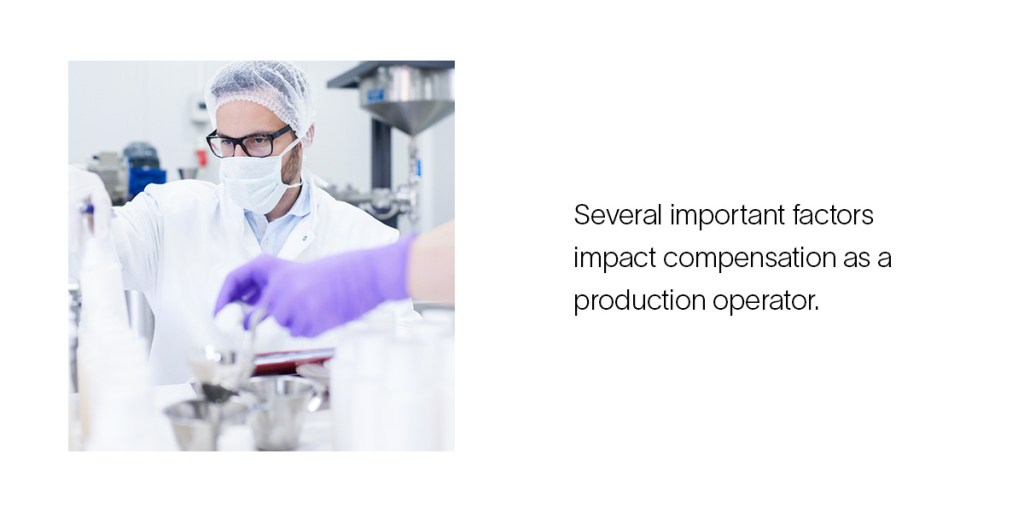
As a production operator, compensation can vary according to several factors.
Industry and Regulations
Pay is largely influenced by the employer’s industry. Highly regulated industries, such as medical devices, biotech and diagnostics, tend to command higher pay for production operators. This work requires precise control, oversight, documentation and compliance, as well as specialized skills.
Employer
Different companies offer different base salaries for production operator roles. The business’s size, profitability and scale can also impact how much the company pays workers.
The employer may also set pay rates to establish a competitive edge. Other influences may include employee benefits and role demand.
Location
Geography can also significantly impact production operator salaries. Pay typically reflects the surrounding region’s cost of living and labor market. For instance, a manufacturing facility in a high-cost urban area will likely pay higher wages to attract and retain top talent.
Areas with intense competition for skilled operators may experience increased base pay. State labor laws, public transit access and commuting patterns can all impact how an employer determines base pay.
Experience and Certifications
Individuals with robust experience in manufacturing and operations may be able to negotiate higher pay as a production operator. Certain credentials could also help job candidates achieve higher pay eligibility, such as:
- Association Connecting Electronics Industries Acceptability of Electronic Assemblies
- Requirements and Acceptance for Cable and Wire Harness Assemblies
- American Society for Quality Certified Quality Technician
- Occupational Safety and Health Administration 10-hour and 30-hour Outreach Training for General Industry
Schedule
A production operator’s schedule will also directly impact earnings potential. For example, some employers offer overtime, holiday pay and weekend shifts. How the company manages worker hours, such as rotating shifts or 12-hour compressed schedules, can also impact pay. Other earnings, like on-call stipends, may increase a worker’s annual income.
Career Growth Opportunities as a Production Operator
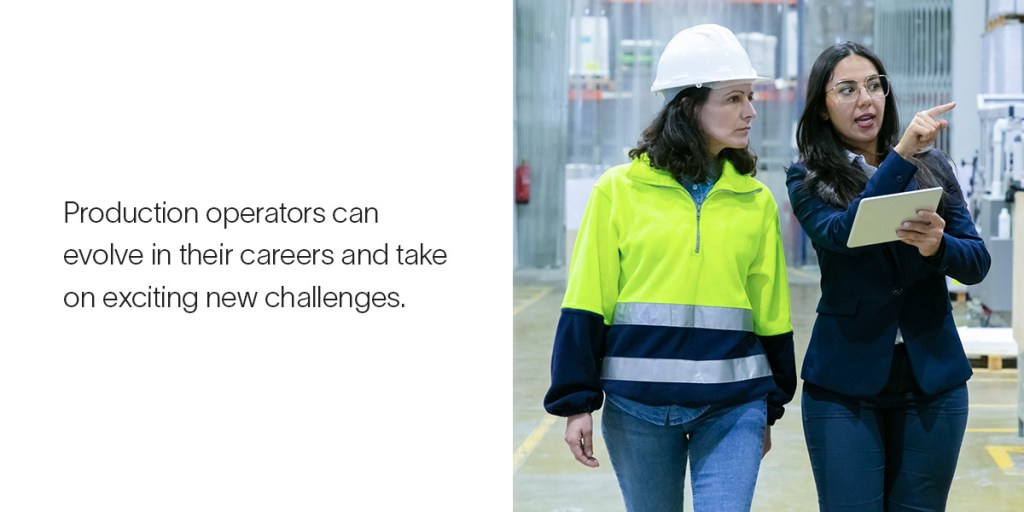
A production operator’s career trajectory can look very different depending on the company, expertise and long-term goals.
Here’s an idea of how an individual may progress in their career as a production operator:
- Year 1: The first year may involve mastering SOPs, safety best practices and machine operation. Operators will acquire an understanding of how to use inspection tools and properly document their work.
- Years 1 to 3: Workers may cross-train, take on changeovers and learn more advanced troubleshooting techniques. Upon acquiring the foundational understanding of machines and processes, production operators may pursue specialized certifications or training to support continuous improvement.
- Years 3 to 5: Production operators may move into more specialized roles, such as working in cleanrooms or operating complex CNC equipment. They may also step into leadership or training positions.
- Years 5+: With several years of experience under their belts, production operators may move into more senior or technical roles, such as supervisor.
For motivated individuals, a production operator position can be a fulfilling career path. It offers many opportunities to learn new parts of the production process and flex diverse skills.
What advice would you give to a potential applicant considering a Software Engineering career at Danaher?
“Consider working different shifts to increase chances of getting hired.”
Sr Advisor, Talent Acquisition
Danaher
Bring More to Life as a Production Operator at Danaher

At Danaher, we’re advancing human health through the power of technology and science. The Danaher Business System unites our portfolio of world-class brands. Our mission is to solve complex health challenges, drive continuous innovation and ultimately improve quality of life around the globe.
“Danaher offers a great company culture, competitive compensation and benefits, and lots of opportunities for learning and development.”
Sr Advisor, Talent Acquisition
Danaher
Accelerate your potential and become part of the Danaher family of companies. Across our businesses, production operators are important to building, assembling and packaging products that directly benefit patient outcomes and scientific progress. Learn more about bringing more to life with a career at Danaher below.
Diagnostics
Our Diagnostics businesses are committed to innovating tools and technologies that enable healthcare providers to improve how they identify and treat patients. Our brands include:
- Beckman Coulter.
- Cepheid.
- HemoCue.
- Leica Biosystems.
- Mammotome.
- Radiometer.
Production operators at Danaher help make life-enhancing products, such as clinical analyzers, disposable cartridges, slides, and liquid reagents, used in laboratories and hospitals.
Life Sciences
Danaher companies are accelerating the advancement of Life Sciences with groundbreaking solutions and products. The following are our industry-leading Life Sciences brands:
- Abcam
- Aldervron
- Beckman Coulter Life Sciences
- Genedata
- Integrated DNA Technologies (IDT)
- IDBS
- Leica Microsystems
- Molecular Devices
- Pall
- Phenomenex
- SCIEX
Production operators in this segment may help with the production of research instruments and consumables, including:
- Microscopes.
- Optics.
- Mass specs.
- High-performance liquid chromatography components.
- Microplates.
- Imagers.
- DNA/RNA oligos.
- Reagents.
Biotechnology
At Danaher, Cytiva leads our Biotechnology segment in advancing therapeutics and bringing transformative medicines to our customers.
Production operators working for Cytiva may contribute to the production of bioprocess solutions, including single-use assemblies and manifolds, chromatography resins, buffers, media and sterile filters.
What to Expect as a Production Operator at Danaher
As a production operator at a Danaher company, you can feel good knowing you’re working where innovation meets impact. You can expect the following when joining our team and advancing your career:
- Purpose-driven work: At Danaher, your daily work directly supports improved patient outcomes and scientific breakthroughs. Embrace your calling, contribute to solving today’s leading health challenges and help us drive greater innovation for high clinical impact.
- Structured training: We want you to build your confidence and take pride in your career at Danaher. We offer structured onboarding and training to ensure you feel ready to take on your role and grow your expertise. Through SOPs and training plans, you’ll have all the tools you need to succeed.
- A culture of quality: Quality is the foundation of all Danaher businesses. We’re committed to making products our customers can depend on and that meet the strictest compliance requirements.
- Inclusivity: You belong at Danaher, where we’re dedicated to building engaged and inclusive teams. We value your expertise, drive and experience, and when you join us, you’ll be empowered to thrive, regardless of your background.
- Continuous improvement: Continuous improvement is the soul of the Danaher Business System. Finding new ways to refine our practices and products allows us to deliver the most innovative solutions to drive better health outcomes.
Browse Production Operator Roles at Danaher Today

The Danaher team is a leader in manufacturing and operations innovation. Our professionals dedicate themselves to driving innovation to improve human health. Join the mission to make life healthier and more sustainable by solving the world’s health challenges.
Are you ready to progress your career — and bring more to life? Browse the manufacturing and operations jobs available at Danaher today, and reach out with any questions.
